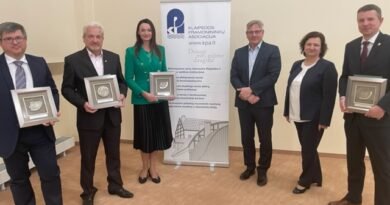IMF urges to focus on productivity increase
Lithuania’s economy showed resilience in the face of pandemic crisis and already demonstrates strong signs of recovery, whereas no significant risks to financial stability are observed at the moment. However, in the future the country should focus more on structural reforms that support productivity growth, in order to avoid being stuck in the middle-income trap.
This conclusion was included in the recommendations provided in the report of the International Monetary Fund’s (IMF) expert group after virtual consultations with the Lithuanian institutions.
“Lithuania’s economy faced the pandemic shock without significant imbalances, having solid economic fundamentals. As the most difficult time for the economy is hopefully already in the past, now is the right time to concentrate on reforms that boost productivity, which would ensure long-term sustainable economic development and create conditions to continue rapid convergence with the Western European countries”
Gediminas Šimkus, Chairman of the Board of the Bank of Lithuania
“We are happy that Lithuania’s economy is among the least affected in the European Union (EU) due to the implemented pandemic support measures. With the economic growth accelerating, it is necessary to ensure that further support is targeted only at vulnerable sectors. Since the pandemic shock subsided, we should focus on addressing the country’s long-standing problems. I am confident that the New Generation Lithuania plan will be a strong reform and investment driver that will boost the country’s competitiveness and growth potential”, said Gintarė Skaistė, Minister of Finance.
Middle-income trap
IMF experts underline that Lithuania’s fiscal response to the crisis was timely and well-founded and provided significant support for both households and businesses. This was the reason why the country’s GDP contracted by just 0.8% in 2020, which is the second-best result in the EU. In the first half of this year, real GDP growth reached 4.8%, whereas the level of economic output already exceeded the pre-pandemic one.
Overall, it is expected that the long-term negative effect of the crisis on the country’s economic structure will be limited, thus as the economic recovery gains ground, state aid should be gradually reduced and targeted only at the most vulnerable sectors.
According to the IMF experts, after reaching sustainable economic recovery, it is necessary for Lithuania to implement reforms boosting productivity growth and solve persistent structural problems, especially in healthcare and education systems. This would help maintain the economy’s competitiveness, create conditions for wage growth, while helping the country overcome the risk of the middle-income trap.
Uneven recovery of trade partners
It is underlined that the EU Recovery Plan for Lithuania may become an instrument that provides a well-needed impetus to implement the necessary economic reforms and drive public investment.
The IMF also warned about potential risks of overheating in particular sectors or at the economy as a whole in the medium and long term. Therefore, the IMF emphasises the importance of appropriately balanced fiscal and macroprudential policy that corresponds to the economic cycle.
Among other potential risks to Lithuania’s economy, the IMF lists an uneven recovery of the main trade partners, geopolitical tensions, disruptions to the vaccination process and a lagging absorption of the EU economic recovery funds.
In the assessment of Lithuania’s financial stability, the IMF noted that the Lithuanian banking sector remains well capitalised, liquid and ready to continue to finance the economy during its recovery phase. Proactive decisions of the Bank of Lithuania in enhancing the prevention of money laundering and terrorist financing, including the foundation of the Centre of Excellence in Anti-Money Laundering, were also evaluated positively.
IMF and Lithuania
Lithuania is a member of the IMF from 1992. It is represented in the IMF’s Board of Governors, which makes the most important decisions, by the Chairman of the Board of the Bank of Lithuania. The Bank of Lithuania coordinates positions of the Republic of Lithuania on the IMF’s policies together with the Ministry of Finance.
Economic consultations in accordance with Article IV of the IMF’s Articles of Agreement form the basis for the cooperation between Lithuania and the IMF. The Article obligates member countries to implement economic and financial policies that ensure national and global financial and economic stability.
Each year, the IMF’s representatives meet live or remotely with the representatives of the Bank of Lithuania, the Government, the private sector and non-governmental organisations, politicians and economic experts, to evaluate the country’s economic situation and development trends and provide recommendations in Article IV Consultation Reports.




